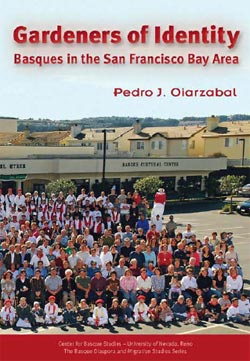 Artetsu Saria 2005
Artetsu Saria 2005
Arbaso Elkarteak Eusko Ikaskuntzari 2005eko Artetsu sarietako bat eman dio Euskonewseko Artisautza atalarengatik
 Buber Saria 2003
Buber Saria 2003
On line komunikabide onenari Buber Saria 2003. Euskonews y Media
 Argia Saria 1999
Argia Saria 1999
Astekari elektronikoari Merezimenduzko Saria

Egilea: Pedro J. Oiarzabal
Argitaratzailea: Center for Basque Studies. University
of Nevada, Reno, 2009
Orrialde kopurua: 368
ISBN: 978-1-877802-88-1
Ezaugarriak: The Center for Basque Studies is proud
to announce the publication of Gardeners of Identity: Basques in San Francisco
Bay Area by Pedro J. Oiarzabal. The book uses historical archive research
and voluminous interviews to trace the history of San Francisco’s Basque
population from the city’s prehistory to the present.
Under the Spanish Empire many Basques played key roles in the establishment
of settlements throughout California with particular emphasis on today’s
San Francisco Bay Area. In 1774 Basque Creole Juan Bautista de Anza explored
the San Francisco Bay and located the sites for Mission Dolores and the
San Francisco Presidio. Anza’s second in command, José Joaquín
Moraga, and Father Francisco Palóu founded the mission in June
of 1776 and royal presidio in December of the same year.
Basque immigration continued as the region changed from Spanish, to Mexican,
to American hands in the nineteenth century. Waves of Basque immigrants migrated
especially in the nineteenth and early twentieth century, when many Basques
arrived to work as sheepherders across the American West. Many also settled
in San Francisco, where they formed landscaping enterprises, bakeries, boardinghouses
and restaurants among many other businesses. As their population grew, they
also formed associations, culminating in the building of the Basque Cultural
Center in South San Francisco, which is an important meeting point for Basques
in the area to this day.
Author Pedro J. Oiarzabal employed an innovative research method that focused
on empowering the Basque community to conduct and compile its own research,
the result of which are hundreds of interviews, many conducted by community
members or as parts of the round table discussions, with Basque immigrants
and descendants who populate the pages of this fascinating book.
Dr. Oiarzabal was born and raised in Bilbao, Basque Country and has spent
much of his life between the Basque Country, Ireland, and the United States.
He is a Visiting Research Scholar at the University of Nevada, Reno since
2007. Among his publications are La Identidad Vasca en el Mundo (2005) and
A Candle in the Night: Basque Studies at the University of Nevada, 1967–2007
(2007).
For information: http://basque.unr.edu
or contact: dmontero@unr.edu
Un nuevo libro del Centro de Estudios Vascos recoge la historia de
la comunidad vasca de San Francisco, California
El Centro de Estudios Vascos de la Universidad de Nevada, Reno está
orgulloso en anunciar la publicación de Gardeners of Identity:
Basques in San Francisco Bay Area de Pedro J. Oiarzabal, con prólogo
de John Garamendi, Vice-gobernador del Estado de California e introducción
de Paddy Woodworth, autor especializado en temas vascos. El libro combina
la investigación de archivos con numerosas entrevistas con el objetivo
de dibujar la historia de la población vasca en San Francisco desde
sus orígenes hasta el presente.
Gardeners of Identity narra la historia de los vascos de la Bahía
de San Francisco y el trabajo que han llevado a favor de la cultura vasca
y del Euskera tanto en el Estado de California como en el resto de Estados
Unidos desde hace 160 años. Destacados vascos han jugado a lo largo
de la historia un papel fundamental en la exploración de la costa californiana,
el establecimiento y administración de misiones, fortificaciones y
gobiernos locales durante el Imperio Español y el nuevo régimen
instaurado tras la independencia de México. Bajo el Gobierno de Estados
Unidos la emigración vasca a California floreció a lo largo
del siglo XIX hasta mediados del siglo XX, dando lugar al establecimiento
permanente de comunidades en la Bahía de San Francisco. El libro examina
tanto la evolución de dichas comunidades como las asociaciones que
han creado con el objetivo de mantener y preservar su identidad en una sociedad
altamente multicultural, plurilingüe e industrializada.
Para más información: http://basque.unr.edu
o contactar con: dmontero@unr.edu